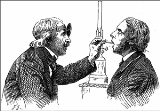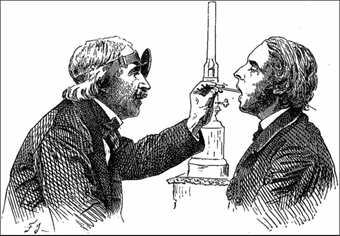
Manuel Patricio Rodríguez García
Encyclopedia
Manuel Patricio Rodríguez García (17 March 1805 – 1 July 1906), was a Spanish
singer, music educator, and vocal pedagogue
.
in Badajoz Province
, Spain
. His father was singer and teacher Manuel del Pópulo Vicente Rodriguez García
(Manuel García I, 1775–1832). His sisters were María Felicia García Sitches
(1808–1836) and Michelle Ferdinande Pauline García (1821–1910). After abandoning his onstage career as a baritone
, García began to teach at the Paris Conservatory (1830–48) and the Royal Academy of Music
, London
(1848–95). Jessie Bond
, Camille Everardi
, Erminia Frezzolini
, Jenny Lind
, Mathilde Marchesi
, Christina Nilsson
, Julius Stockhausen
, Marie Tempest
, and Henry Wood
were among his pupils. He invented a laryngoscope
in 1854 and the next year published observations of his own larynx
and vocal cords made with a small dental mirror introduced into the throat and using sunlight reflected by another mirror. García was interested in movements connected with the production of the singing voice and did not anticipate the importance of laryngoscopy for medicine. Still, the University of Königsberg
conferred upon him the honorary degree of M.D.
He died in London
in 1906 at the age of 101 years and was buried in the churchyard of St. Edward's Catholic church in Sutton Green, Surrey. His grave gives details of his many famous pupils and accomplishments.
On 22 November 1832 in Paris
García married the operatic soprano Cécile Eugénie Mayer (Paris
, 8 April 1814 – Paris
, 12 August 1880). They had two sons and two daughters. Their son Gustave Garcia
(1837–1925) was a singer, actor, and author of three books on vocal and stage techniques. Gustave's son, Alberto García (1875–1946), studied voice with his great aunt (Pauline Viardot), became a respected baritone, and produced an edition of his grandfather's treatise on singing (1924).

Spanish people
The Spanish are citizens of the Kingdom of Spain. Within Spain, there are also a number of vigorous nationalisms and regionalisms, reflecting the country's complex history....
singer, music educator, and vocal pedagogue
Vocal pedagogy
Vocal pedagogy is the study of the art and science of voice instruction. It is used in the teaching of singing and assists in defining what singing is, how singing works, and how proper singing technique is accomplished....
.
Biography
García was born on 17 March 1805 in the town of ZafraZafra
Zafra is a town situated in the Province of Badajoz , and the capital of the comarca of Zafra - Río Bodión. It has a population of 16,242, according to the figures of 2009....
in Badajoz Province
Badajoz (province)
The province of Badajoz is a province of western Spain located in the autonomous community of Extremadura. It was formed in 1833. It is bordered by the provinces of Cáceres, Toledo, Ciudad Real, Córdoba, Seville, and Huelva, and by Portugal....
, Spain
Spain
Spain , officially the Kingdom of Spain languages]] under the European Charter for Regional or Minority Languages. In each of these, Spain's official name is as follows:;;;;;;), is a country and member state of the European Union located in southwestern Europe on the Iberian Peninsula...
. His father was singer and teacher Manuel del Pópulo Vicente Rodriguez García
Manuel García (tenor)
Manuel del Pópulo Vicente Rodriguez García was a Spanish opera singer, composer, impresario, and singing teacher.-Biography:...
(Manuel García I, 1775–1832). His sisters were María Felicia García Sitches
Maria Malibran
The mezzo-soprano Maria Malibran , was one of the most famous opera singers of the 19th century. Malibran was known for her stormy personality and dramatic intensity, becoming a legendary figure after her death at age 28...
(1808–1836) and Michelle Ferdinande Pauline García (1821–1910). After abandoning his onstage career as a baritone
Baritone
Baritone is a type of male singing voice that lies between the bass and tenor voices. It is the most common male voice. Originally from the Greek , meaning deep sounding, music for this voice is typically written in the range from the second F below middle C to the F above middle C Baritone (or...
, García began to teach at the Paris Conservatory (1830–48) and the Royal Academy of Music
Royal Academy of Music
The Royal Academy of Music in London, England, is a conservatoire, Britain's oldest degree-granting music school and a constituent college of the University of London since 1999. The Academy was founded by Lord Burghersh in 1822 with the help and ideas of the French harpist and composer Nicolas...
, London
London
London is the capital city of :England and the :United Kingdom, the largest metropolitan area in the United Kingdom, and the largest urban zone in the European Union by most measures. Located on the River Thames, London has been a major settlement for two millennia, its history going back to its...
(1848–95). Jessie Bond
Jessie Bond
Jessie Bond was an English singer and actress best known for creating the mezzo-soprano soubrette roles in the Gilbert and Sullivan comic operas. She spent twenty years on the stage, the bulk of them with the D'Oyly Carte Opera Company.Musical from an early age, Bond began a concert singing...
, Camille Everardi
Camille Everardi
Camille Everardi was a Belgian operatic baritone who had an active international career during the 1850s through the 1870s. He particularly excelled in the works of Vincenzo Bellini and Gioachino Rossini. Several music critics of his day likened his voice to that of Antonio Tamburini...
, Erminia Frezzolini
Erminia Frezzolini
Erminia Frezzolini was an Italian operatic soprano. Along with Henriette Sontag, she was one of the leading operatic sopranos of her generation. She excelled in the coloratura soprano repertoire, drawing particular acclaim in the bel canto operas of Gaetano Donizetti and Vincenzo Bellini...
, Jenny Lind
Jenny Lind
Johanna Maria Lind , better known as Jenny Lind, was a Swedish opera singer, often known as the "Swedish Nightingale". One of the most highly regarded singers of the 19th century, she is known for her performances in soprano roles in opera in Sweden and across Europe, and for an extraordinarily...
, Mathilde Marchesi
Mathilde Marchesi
Mathilde Marchesi was a German mezzo-soprano, a renowned teacher of singing, and a proponent of the bel canto vocal method.-Biography:...
, Christina Nilsson
Christina Nilsson
Christina Nilsson, Countess de Casa Miranda, was a Swedish operatic soprano. She possessed a brilliant bel canto technique and was considered a rival to the Victorian era's most famous diva, Adelina Patti...
, Julius Stockhausen
Julius Stockhausen
Julius Christian Stockhausen was a German singer and singing master.- Life :Stockhausens' parents, Franz Stockhausen Sr...
, Marie Tempest
Marie Tempest
Dame Marie Tempest DBE was an English singer and actress known as the "queen of her profession".Tempest became the most famous soprano in late Victorian light opera and Edwardian musical comedies. Later, she became a leading comic actress and toured widely in North America and elsewhere...
, and Henry Wood
Henry Wood (conductor)
Sir Henry Joseph Wood, CH was an English conductor best known for his association with London's annual series of promenade concerts, known as the Proms. He conducted them for nearly half a century, introducing hundreds of new works to British audiences...
were among his pupils. He invented a laryngoscope
Laryngoscope
Laryngoscopy is a medical procedure that is used to obtain a view of the vocal folds and the glottis. Laryngoscopy may be performed to facilitate tracheal intubation during general anesthesia or cardiopulmonary resuscitation or for procedures on the larynx or other parts of the upper...
in 1854 and the next year published observations of his own larynx
Larynx
The larynx , commonly called the voice box, is an organ in the neck of amphibians, reptiles and mammals involved in breathing, sound production, and protecting the trachea against food aspiration. It manipulates pitch and volume...
and vocal cords made with a small dental mirror introduced into the throat and using sunlight reflected by another mirror. García was interested in movements connected with the production of the singing voice and did not anticipate the importance of laryngoscopy for medicine. Still, the University of Königsberg
University of Königsberg
The University of Königsberg was the university of Königsberg in East Prussia. It was founded in 1544 as second Protestant academy by Duke Albert of Prussia, and was commonly known as the Albertina....
conferred upon him the honorary degree of M.D.
Doctor of Medicine
Doctor of Medicine is a doctoral degree for physicians. The degree is granted by medical schools...
He died in London
London
London is the capital city of :England and the :United Kingdom, the largest metropolitan area in the United Kingdom, and the largest urban zone in the European Union by most measures. Located on the River Thames, London has been a major settlement for two millennia, its history going back to its...
in 1906 at the age of 101 years and was buried in the churchyard of St. Edward's Catholic church in Sutton Green, Surrey. His grave gives details of his many famous pupils and accomplishments.
On 22 November 1832 in Paris
Paris
Paris is the capital and largest city in France, situated on the river Seine, in northern France, at the heart of the Île-de-France region...
García married the operatic soprano Cécile Eugénie Mayer (Paris
Paris
Paris is the capital and largest city in France, situated on the river Seine, in northern France, at the heart of the Île-de-France region...
, 8 April 1814 – Paris
Paris
Paris is the capital and largest city in France, situated on the river Seine, in northern France, at the heart of the Île-de-France region...
, 12 August 1880). They had two sons and two daughters. Their son Gustave Garcia
Gustave Garcia
Gustave Garcia was an Italian baritone opera singer and singing teacher.-Biography:He was born on February 1, 1837 in Milan, Italy to Manuel Patricio Rodríguez García and soprano Eugénie Mayer...
(1837–1925) was a singer, actor, and author of three books on vocal and stage techniques. Gustave's son, Alberto García (1875–1946), studied voice with his great aunt (Pauline Viardot), became a respected baritone, and produced an edition of his grandfather's treatise on singing (1924).
Works

- Mémoire sur la voix humaine présenté à l'Académie des Sciences en 1840. Paris: Duverger, 1847.
- Ecole de García: traité complet de l'art du chant par Manuel García fils. Mayence, Paris: Schott 1840 (Teil 1), 1847 (Teil 2).
- Garcías Schule oder Die Kunst des Gesanges in allen ihren Theilen vollst. abgehandelt von Manuel García. Deutscher Text von C. Wirth. Mainz: Schott, 1841; auch in zwei Teilen in der Zeitschrift Caecilia; Erster Theil, in Band 22 (1843), Heft 85; Zweiter Theil in Band 26 (1847), Heft 104 (Digitalisat)
- Ecole de García: traité complet de l'art du chant. (Band 1 und 2 zusammen). Mayence, Paris: Schott 1856.
- A complete treatise on the art of singing, part two by M. García II. Second part, complete and unabridged, the editions of 1847 and 1872 collated, ed. and transl. by Donald V. Paschke. Reprint of the 1872 edition. New York: Da Capo Press, 1975. ISBN 0-306-76212-9. ISBN 0-306-70660-1. (Note: Includes bibliographies).

